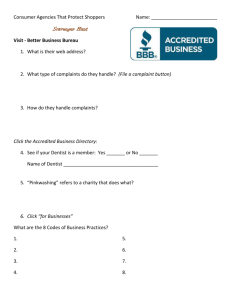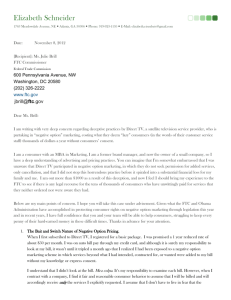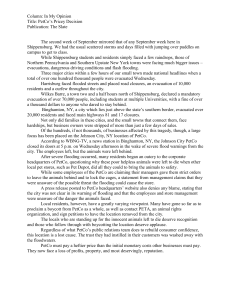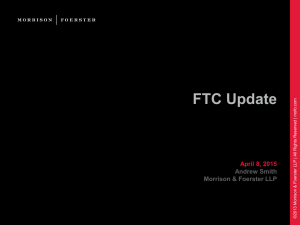Practitioner’s Perspective Information Security Statements Can Become Obligations by Holly K. Towle, J.D.
advertisement
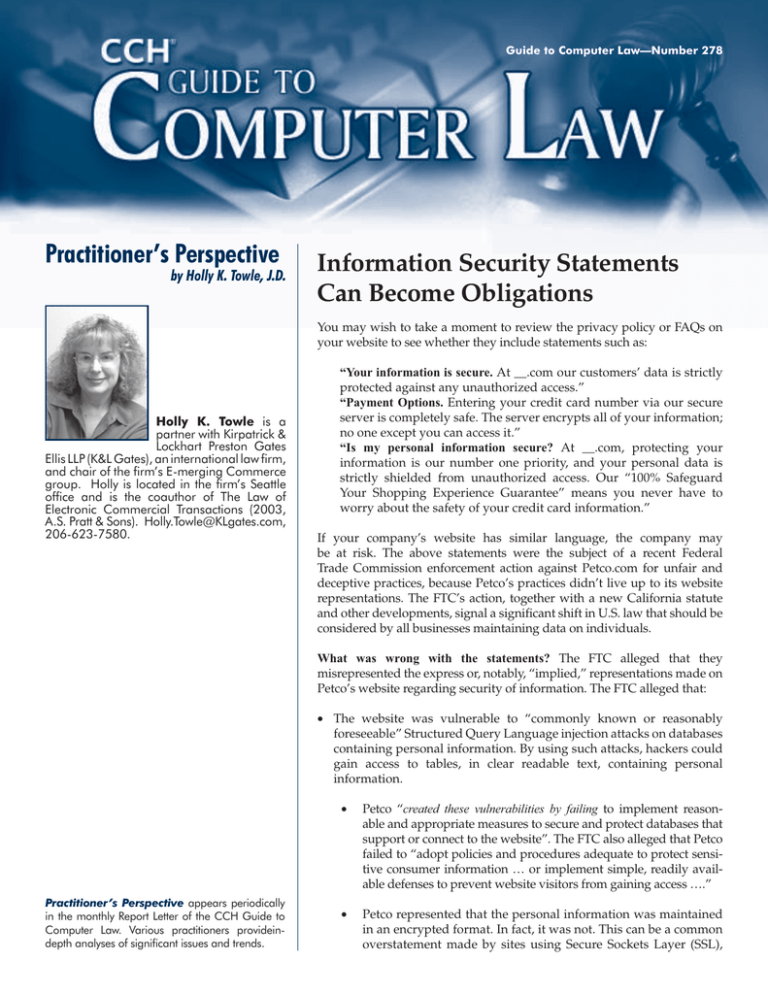
Guide to Computer Law—Number 278 Practitioner’s Perspective by Holly K. Towle, J.D. Information Security Statements Can Become Obligations You may wish to take a moment to review the privacy policy or FAQs on your website to see whether they include statements such as: Holly K. Towle is a partner with Kirpatrick & Lockhart Preston Gates Ellis LLP (K&L Gates), an international law firm, and chair of the firm’s E-merging Commerce group. Holly is located in the firm’s Seattle office and is the coauthor of The Law of Electronic Commercial Transactions (2003, A.S. Pratt & Sons). Holly.Towle@KLgates.com, 206-623-7580. “Your information is secure. At __.com our customers’ data is strictly protected against any unauthorized access.” “Payment Options. Entering your credit card number via our secure server is completely safe. The server encrypts all of your information; no one except you can access it.” “Is my personal information secure? At __.com, protecting your information is our number one priority, and your personal data is strictly shielded from unauthorized access. Our “100% Safeguard Your Shopping Experience Guarantee” means you never have to worry about the safety of your credit card information.” If your company’s website has similar language, the company may be at risk. The above statements were the subject of a recent Federal Trade Commission enforcement action against Petco.com for unfair and deceptive practices, because Petco’s practices didn’t live up to its website representations. The FTC’s action, together with a new California statute and other developments, signal a significant shift in U.S. law that should be considered by all businesses maintaining data on individuals. What was wrong with the statements? The FTC alleged that they misrepresented the express or, notably, “implied,” representations made on Petco’s website regarding security of information. The FTC alleged that: • The website was vulnerable to “commonly known or reasonably foreseeable” Structured Query Language injection attacks on databases containing personal information. By using such attacks, hackers could gain access to tables, in clear readable text, containing personal information. Practitioner’s Perspective appears periodically in the monthly Report Letter of the CCH Guide to Computer Law. Various practitioners provideindepth analyses of significant issues and trends. • Petco “created these vulnerabilities by failing to implement reasonable and appropriate measures to secure and protect databases that support or connect to the website”. The FTC also alleged that Petco failed to “adopt policies and procedures adequate to protect sensitive consumer information … or implement simple, readily available defenses to prevent website visitors from gaining access ….” • Petco represented that the personal information was maintained in an encrypted format. In fact, it was not. This can be a common overstatement made by sites using Secure Sockets Layer (SSL), CCH GUIDE TO COMPUTER LAW NUMBER 278 a protocol for managing the security of message transmissions. As stated by the FTC, SSL encrypts credit card information during certain transmissions, but not during storage. In Petco’s case, once the information hit the Petco server, it was decrypted and maintained in clear readable text. • Petco expressly or impliedly represented that it implemented reasonable and appropriate measures to protect information, but did not actually do so. In particular, it “failed to implement procedures that were reasonable and appropriate to: (1) detect reasonably foreseeable application vulnerabilities, and (2) prevent visitors from exploiting such vulnerabilities and obtaining unauthorized access to sensitive consumer information. Therefore, the representation was false or misleading.” To the extent that Petco said one thing and did another, the FTC’s action is not surprising The more notable aspect of the FTC allegations is that they, in effect, assume a duty to adopt reasonable security procedures. The basis for that is not yet clear in general law, but it is abundantly clear that it is the FTC’s view. What is the new California law? As of September, 2004, a new California law1 creates a general security requirement for personal information regarding California residents. Businesses controlling information covered by the law must “implement and maintain reasonable security procedures and practices appropriate to the nature of the information, to protect the personal information from unauthorized access, destruction, use, modification, or disclosure.” That rule pertains to the business’ own action. The new California law also impacts third parties. If the business discloses the information under a contract with a nonaffiliated third party, it must require by contract that the third party implement and maintain the above security procedures. Generally, the new California law does not cover entities already subject to greater security obligations (e.g., under federal laws for financial institutions or health care providers), so its primary impact is to create a security obligation for all other businesses. If it withstands challenge, it will be the first federal or state law to impose such a general requirement. Are there other noteworthy developments in the information security arena? You bet. For example: • Actions Against “Financial Institutions.” The FTC recently took enforcement action against two relatively small mortgage companies for failing to comply with the federal Gramm Leach Bliley Act. Although it only applies to “financial institutions,” that term is very broadly defined to include businesses that do not think of themselves as “financial institutions.” The term includes insurance, investment, and securities companies, as well as (per the FTC) “companies providing many other types of financial products and services to consumers. These institutions include, for example, payday lenders, checkcashing businesses, professional tax preparers, auto dealers engaged in financing or leasing, electronic funds transfer networks, mortgage brokers, credit counselors, real estate settlement companies, and retailers that issue credit cards to consumers.” This is a broad group and the list is not complete. • Peer-to-Peer File Sharing. The governor of California and the federal Office of Management and Budget each issued directives expressing concern about security issues created by the use of peer-to-peer file-sharing technology (a technology facilitating file sharing among computer users). Government officials or agencies must establish appropriate safeguards before allowing use of peer-to-peer technology on governmental computer systems. Forty-seven state attorneys general also recently joined in a letter to peer-to-peer software publishers. The letter suggests that those attorneys general may view as an unfair or deceptive act against consumers, a failure to make certain disclosures about the technology that can “invade their privacy and threaten their security.” • Disposal of Individual Information. Effective June 1, 2005, a new FTC regulation requires businesses to take “reasonable measures to protect against unauthorized access to or use” of “consumer information” in connection with its disposal. Financial institution regulators and the SEC are issuing consistent rules that will apply in addition to any Gramm Leach Bliley obligations. “Consumer information” is electronic or paper information about individuals if it is a consumer report (a/k/a credit report), or is derived from one. According to FTC staff, “derived from” covers the waterfront, including information taken from a consumer report or resulting from its manipulation or combination with other information. “Disposal” includes both discarding or disposing of the information itself, and also disposing of any medium on which the information is stored such as paper, or a computer or personal data assistant (including sales, donations, and any other transfer). A wide universe of businesses are covered by this new rule, including lenders, insurers, employers, landlords, government agencies, automobile dealers, mortgage brokers, disposal companies, and other users of consumer reports. There are many other rules relating to information security laws and many of them require adoption of written policies and procedures, implementation and monitoring. It is important for businesses holding information that is subject to these rules to generate such policies and procedures. ENDNOTES 1 CA LEGIS 877 (2004).

